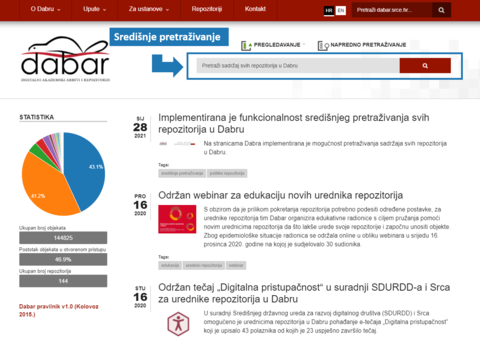In the national infrastructure for repositories and archives DABAR, more than 140 repositories are currently established on the network domains of institutions. Most of these are institutional repositories where institutions store the results of their employees' and students' work. In addition, there are also collective repositories such as the National Repository of Final Thesis (ZIR) and the National Repository of Dissertations and Scientific Master's Theses (DR), as well as the repositories of four universities (University of Zagreb, University of Rijeka, Josip Juraj Strossmayer University of Osijek, University of Split) that display the content of institutional repositories.
By implementing central search users can search all digital objects stored in any repository in DABAR at one place and download object files from the original repository. This will increase the visibility of the repository content and make easier for users to see the production of the science and higher education institutions. At the same time, it is easier for other systems to automatically download metadata, because now the metadata of all objects in DABAR can be downloaded through the unique OAI-PMH interface. Due to the addition of this functionality, a significant change in the structure of visitors is expected. The menu has been upgraded with aim to make it easier for end users to find their way around the pages.
Repository policies are defined which contains the terms of use and rules for storing content into repository. The policies, as well as the functionality of the central search, were defined by the Coordination Committee of DABAR (KO DABAR; review of minutes: minutes 9/12/2020 , minutes 13/1/2021 ). In the footer of the webpage, a link has been added to the repository policies. The data, metadata, content and storage policies have been adopted and published, and the preservation and privacy policy are currently being developed. KO DABAR developed the repository policies based on the optimal recommendations of OpenDOAR, the repository policies of the Ruđer Bošković Institute (FULIR) and the Faculty of Humanities and Social Sciences University of Zagreb (DARHIV), as well as policies generated using the RePol (Repository Policy Generator) tool, which was created as part of the NI4OS -Europe project.



